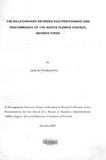| dc.description.abstract | The cut flower industry is an important economic sector for Kenya, earning over US $ 400
million annually and leading in exports to the European Union with a 31% global share.
However, growing environmental awareness and ethical concerns of consumers in export
countries, along with trade unions, are putting pressure on the global floriculture industry to
develop and conform to codes of conduct for environment, agro-chemical use, workers' health
and safety in order to access their markets. The Kenya Flower Council has developed an
Environmental Code of Practice which members must follow with respect to protective clothing
for workers, safe agro-chernical and water use. Members who adhere to this Environmental
Code are accredited either gold or silver and are expected to enjoy a competitive advantage in
accessing foreign market thereby increasing sales. The objective of this study therefore, is to
determine the relationship between eco-positioningas measured by these certification levels and
business performance of the Council members as measured by salesvolume.
To understand the importance of the ecological environment to the success of the Kenya Flower
Council member firms, a census survey was carried out between August and September 2007.
The results indicate that there is a positive relationship between the certification level and sales
volume. Within the sample, this relationship showed up most clearly in the fact that the noncertified
company had a significantlylower correlation (R2= 0.7131) compared to silver and gold.
The finding provides support for the conjecture that a higher eco-positioning as evidenced by the
certification level increases a firm's abilities to pursue more markets and therefore increase sales.
More specifically, a higher certification such-..as Gold may possibly allow firms to sell "green"
flowers at a higher price or in greater quantity, (2) prompts customers who are otherwise
indifferent to environmentally responsible efforts to buy:'green" goods, (3) improves a firm's
overall reputation among customers, and (4) provides the firm with an "early-mover" advantage
and status as an "industry leader" (given that the better management practice establishes an
industry standard).
The results also indicate that better environmental performance appears to lower costs in the
long term since investments in environmental innovations were reportedly paid back within 5
years. This finding supports the conjecture that implementation of a more efficient production
technology, which reduces agro-chemical and water consumption as well as pollution, enhances
market access.
An important advice to be given to flower firms on the basis of this study is to improve their
performance by a better linkage between the ecological environment and strategic planning and
to communicate this through a 3rd party certification. The positive effects of a firm's business
strategies and its approaches to integrating natural environmental issues into the organisation's
long-term planning, defines a new area of possible competitive advantage and therefore better
performance. An extension of this research could be an assessment of whether a rising average
level of natural environmental development by other productive sectors of industry in Kenya
affects the nature of this relationship. If it does, proactive firms might be in the lead on surviving
in the competitive globalised arena, and defensive firms will be forced to change their perception
on the role of the ecological environment on business performance. | en |

